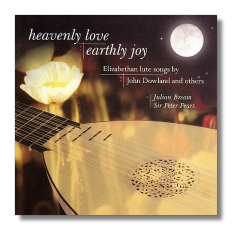
The Internet's Premier Classical Music Source
Related Links
- Latest Reviews
- More Reviews
-
By Composer
-
Collections
DVD & Blu-ray
Books
Concert Reviews
Articles/Interviews
Software
Audio
Search Amazon
Recommended Links
Site News
 CD Review
CD Review
Heavenly Love, Earthly Joy

Elizabethan Lute Songs
- John Dowland:
- I Saw My Lady Weep
- Dear, If You Change
- Stay, Time
- Weep You No More
- Shall I Sue?
- Sweet, Stay Awhile
- Can She Excuse?
- Come, Heavy Sleep
- Wilt Thou Unkind, Thus Leave Me?
- Sorrow, Stay
- The Lowest Trees Have Tops
- Time's Eldest Son, Old Age
- In Darkness Let Me Dwell
- Say, Love, If Ever Thou Did'st Find
- Thomas Morley:
- Absence
- It Was A Lover And His Lass
- Who Is It?
- Philip Rosseter:
- What Then Is Love?
- If She Forsake Me
- When Laura Smiles
- Thomas Ford:
- Come, Phyllis
- Fair, Sweet, Cruel
Julian Bream, lute
Sir Peter Pears, tenor
RCA Red Seal 88697-04927-2 ADD 63:35
The bulk of this CD (that is, most of the songs by Dowland) was recorded in 1963; the remainder dates from 1969. In one form another, this material has not been absent from the catalogues very often or for very long, and it is good to see it offered to a new generation of listeners with the fanciful title of "Heavenly Love, Earthly Joy."
"Semper Dowland, semper dolens," goes the old phrase – in essence, if you're looking for something to bring you down (but not too far) John Dowland (1563-1626) is your man. Many of his lute songs deal with love affairs gone or going wrong, much as today. However, as expressed by Peter Pears in the original booklet note (reprinted here), "Dowland deals in tears and sighs, but they are of cathartic beauty." He and the other composers on this CD lived during the Elizabethan era; Thomas Ford was the youngest of the four.
Nobody says that lute songs have to be sung by a tenor, and there are viable alternative versions of many of these songs performed by either male or female singers. Alfred Deller, a counter-tenor, made a deep impression in this repertoire at the same time as Pears, and many listeners today still can't get Deller's voice out of their head when they think of Dowland's music. Both Deller and Pears favored a very refined performance style. For some, it will seem a little precious now. Pears could hardly avoid sounding like a proper English gentleman, and his reedy and slightly disembodied voice contribute to a feeling of detachment. (Pears was not a singer who was prone to letting himself go.) Even so, there's no lack of intimacy in these readings, and Pears' understanding of Elizabethan style is complete, and put across with assurance. Because Pears' diction is good but not perfect, it is a little unfortunate that texts have not been included in the CD booklet
Bream, as famous for playing the guitar as the lute, also performs with refinement on this CD. Dowland was a lutenist himself (as was Philip Rosseter), and so the lute's role really transcends that of mere accompaniment in his lute songs. These are genuine duets. One senses that Bream and Pears worked very carefully to select the repertoire and to create precisely the effects that they were seeking. The results, while they might not satisfy every connoisseur of the Elizabethan lute song, are undeniably polished, and full of musical integrity.
In spite of being about four decades old, the engineering still is satisfactory, and the only oddity is the occasional cough during the latter part of the program, as if Pears and Bream recorded it live. (Perhaps they did.)
Copyright © 2007, Raymond Tuttle




















